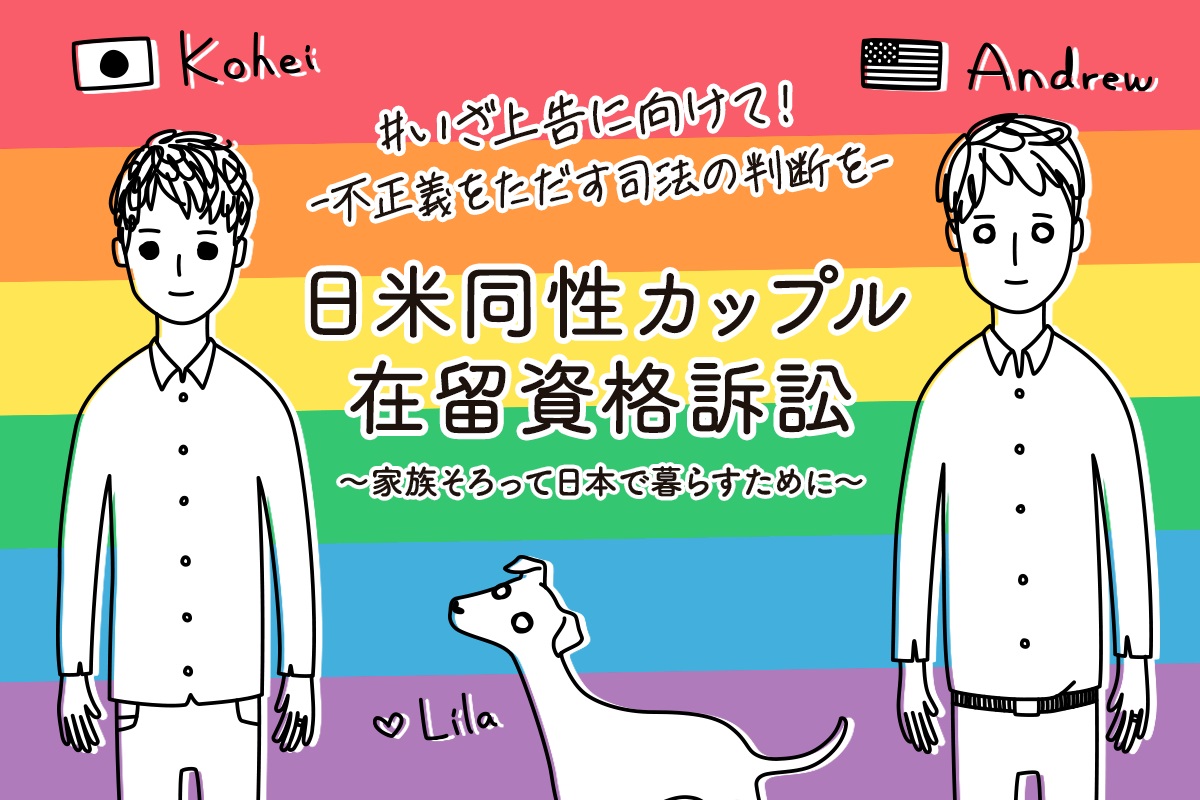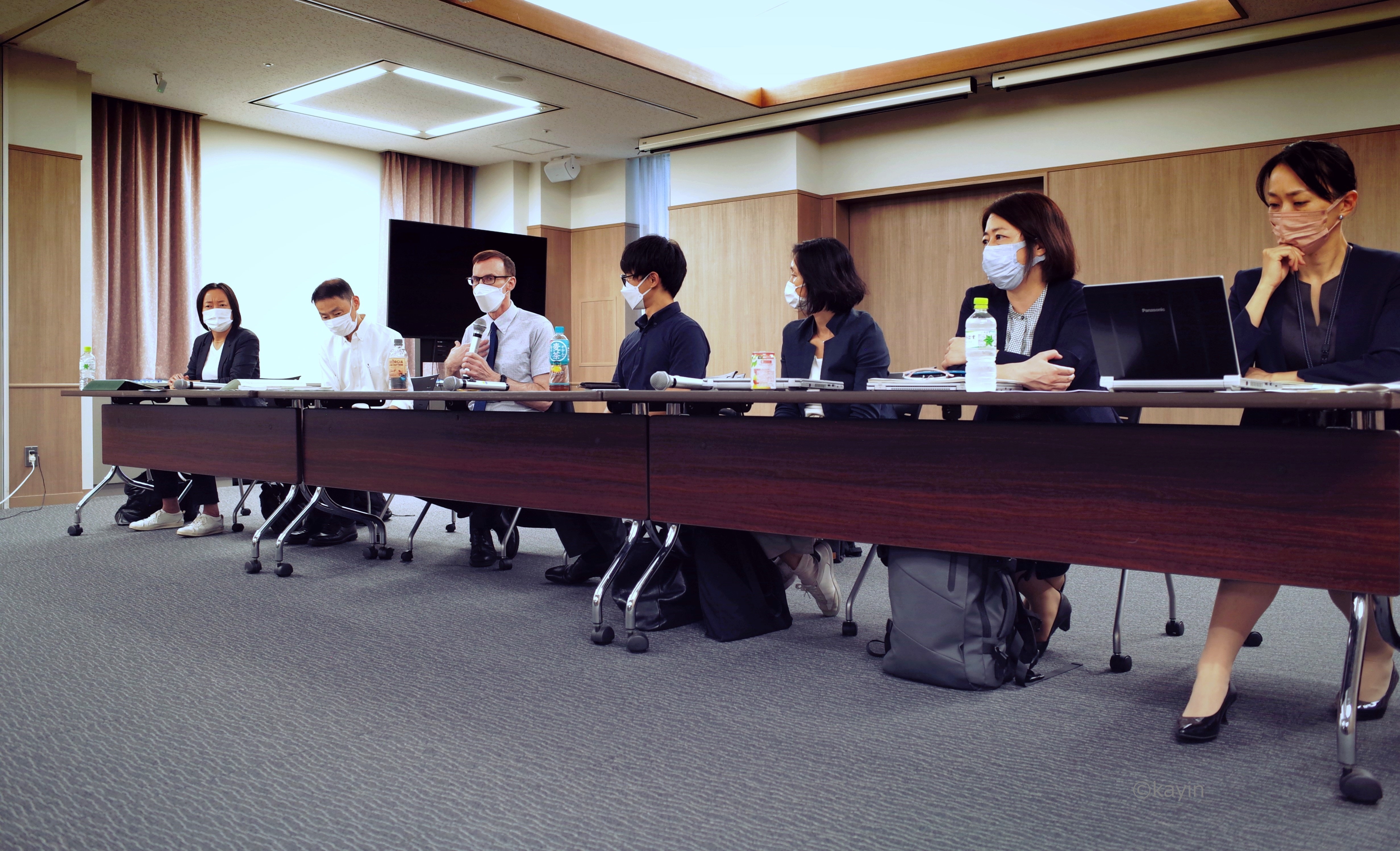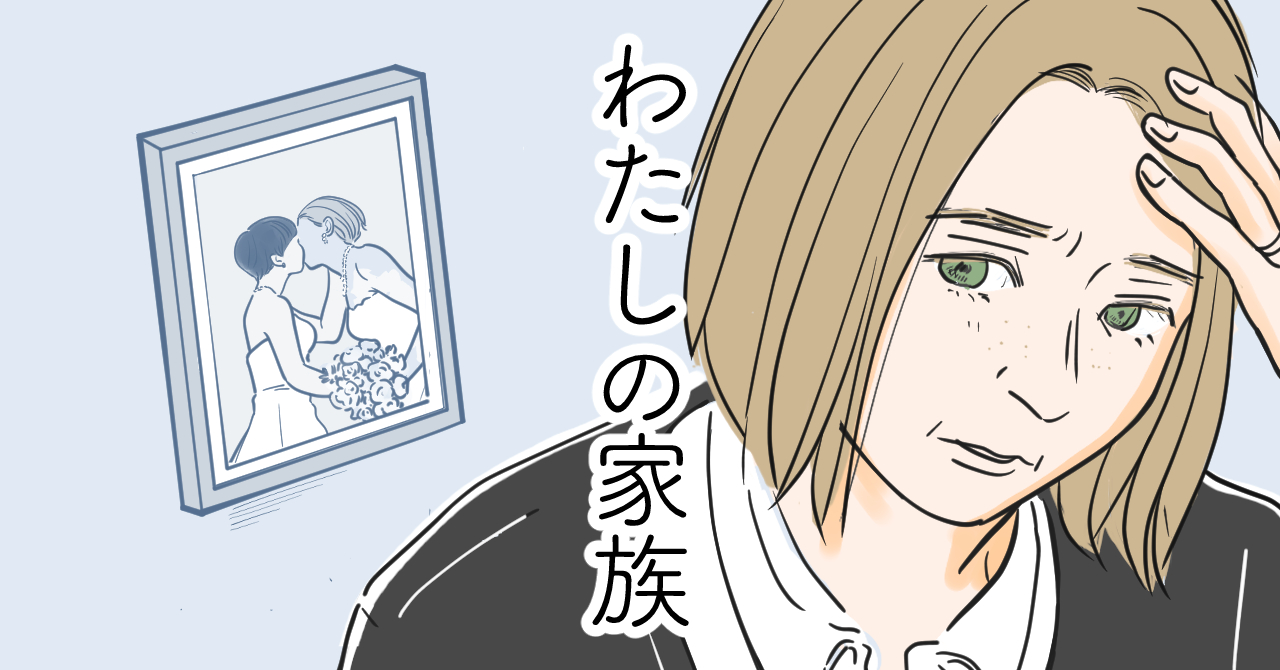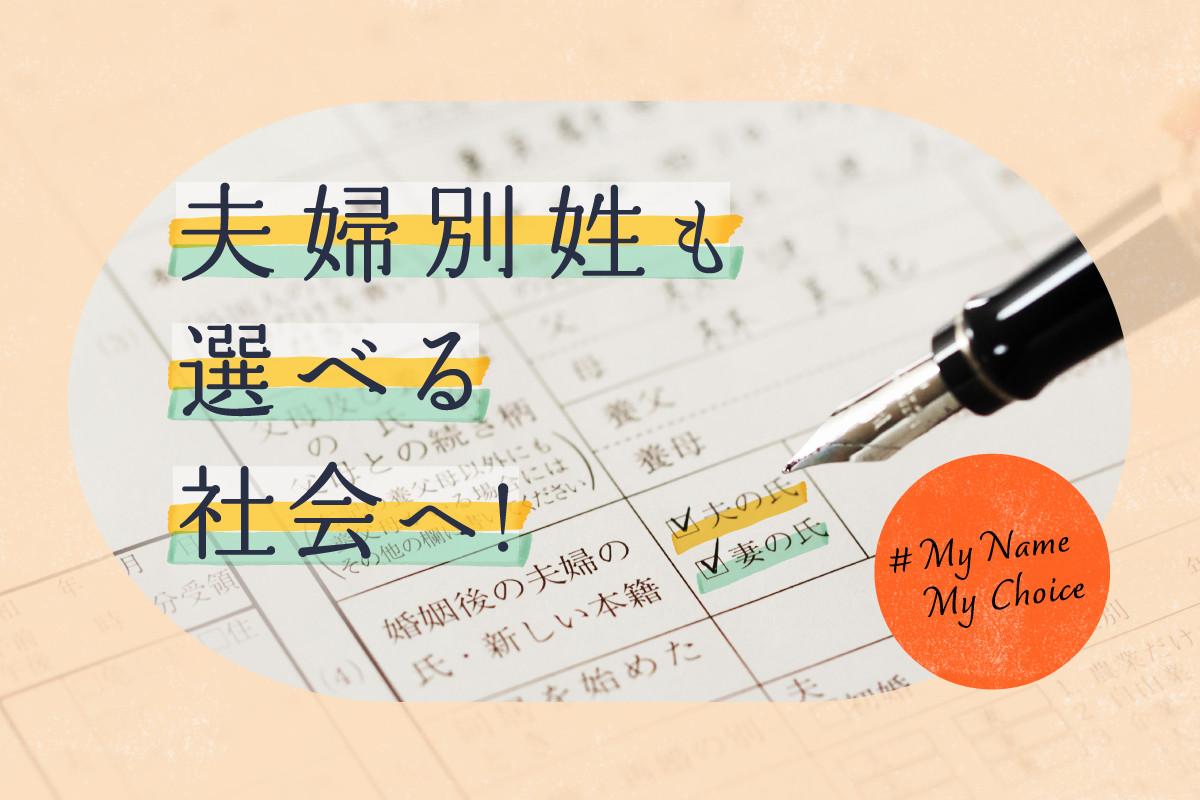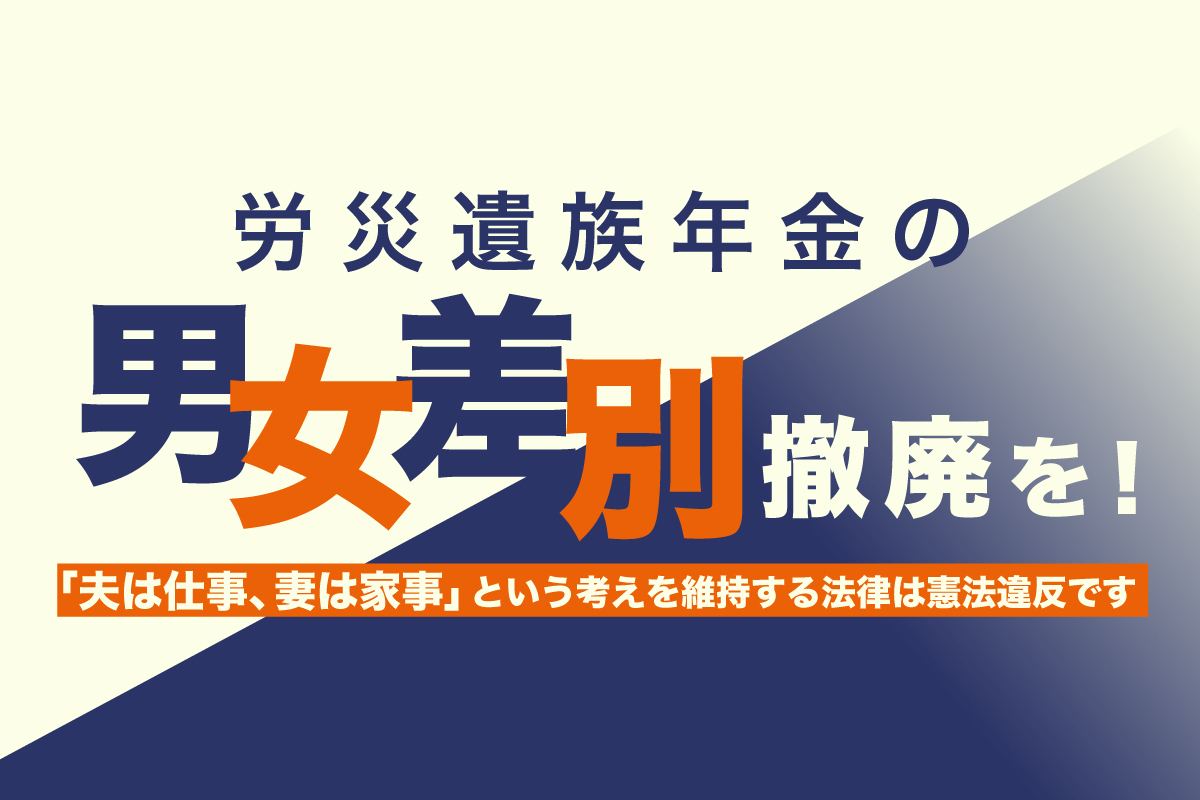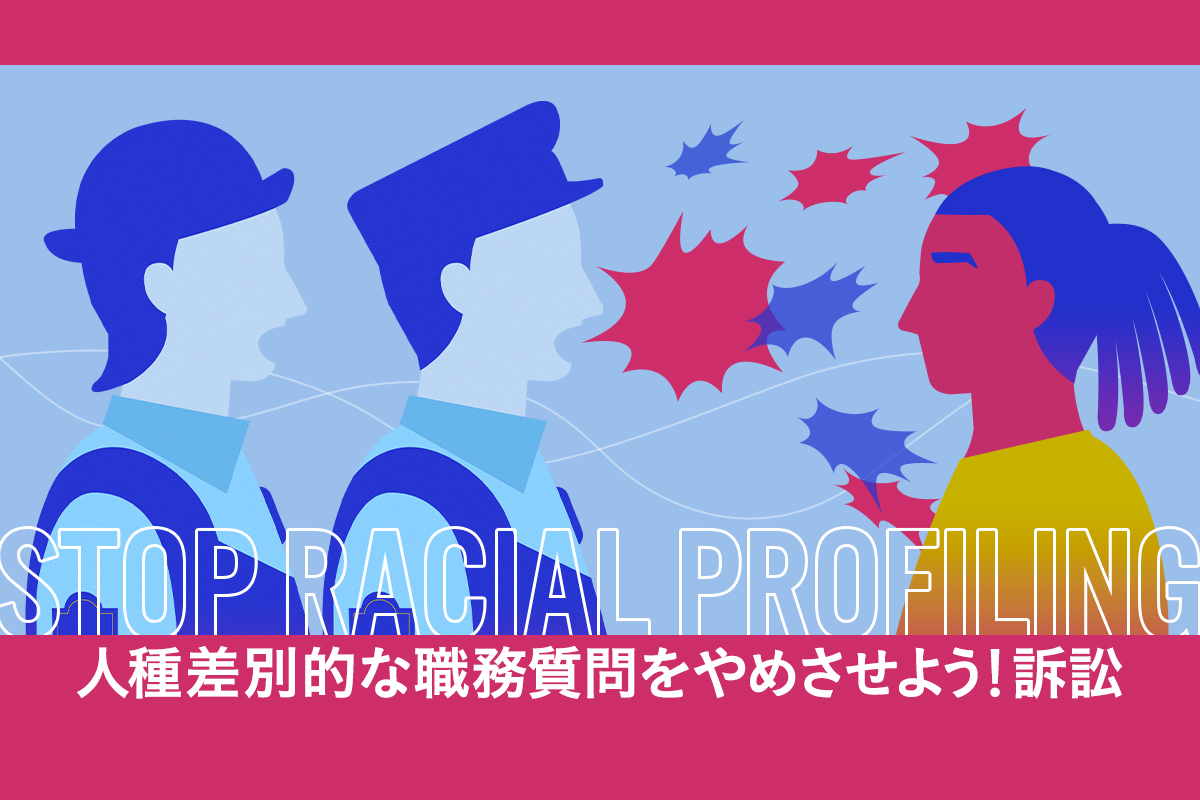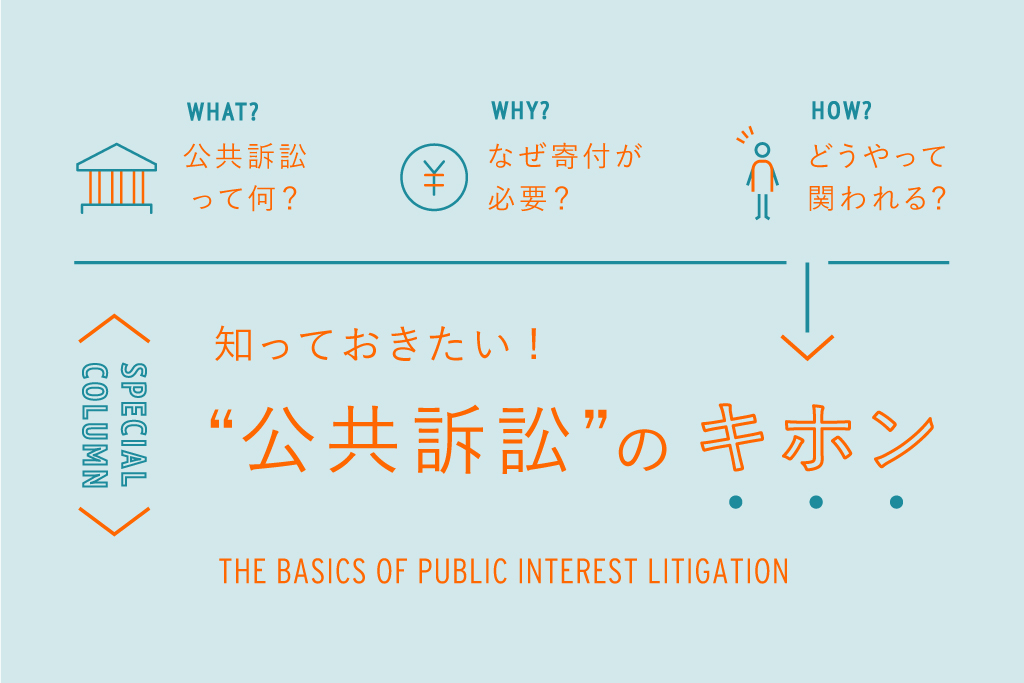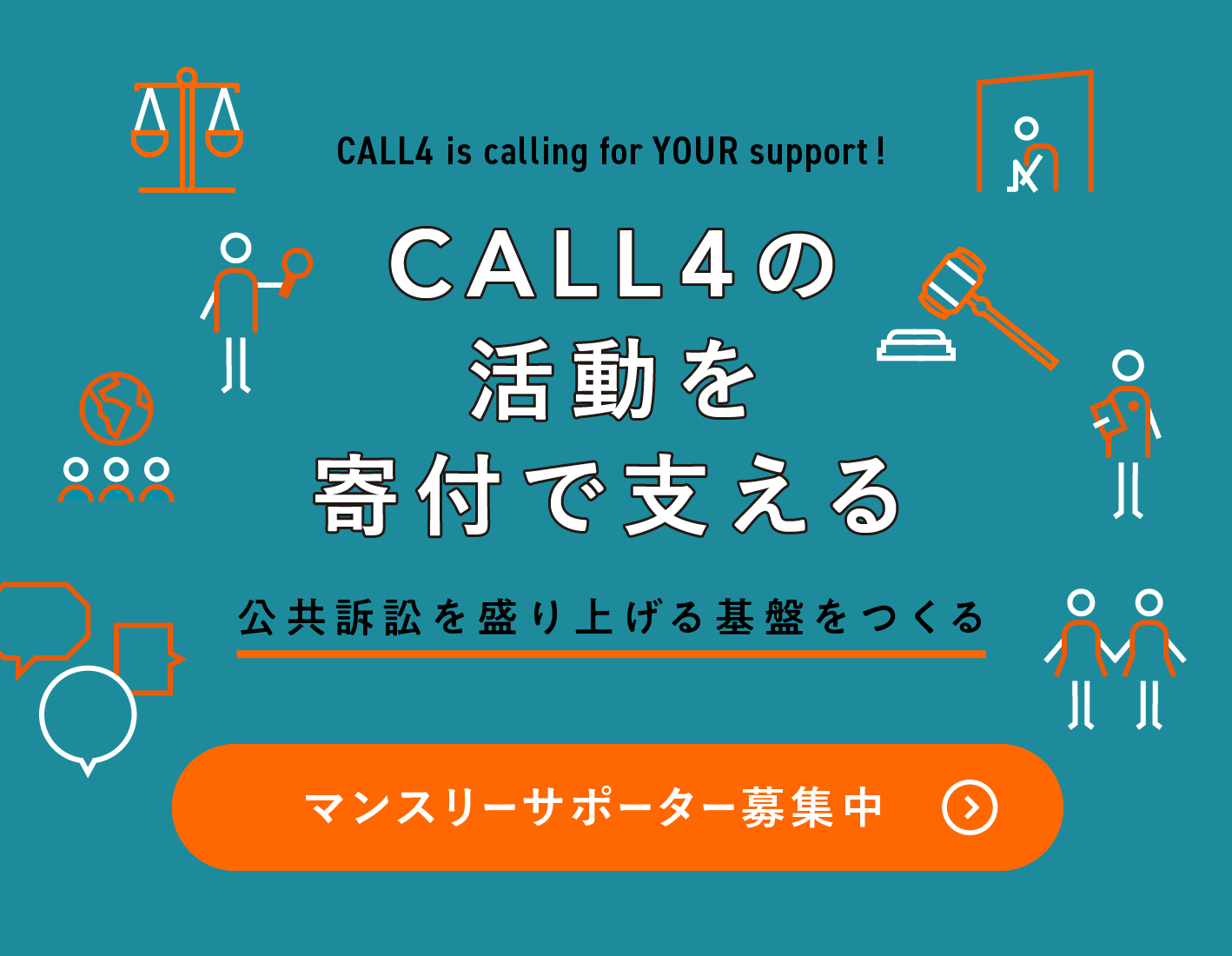上告審へ向けて
2023年11月2日に東京高裁で言い渡された控訴審判決は、アンドリューさんに「定住者」の在留資格を認めるべきだという私たちの主張を認めませんでした。
第一審判決を受けてアンドリューさんは控訴審係属中に「特定活動」の在留資格が許可されました。しかし、アンドリューさんに与えられた「特定活動」は、原則として就労が認められないなど、異性カップルの場合に認められる「日本人の配偶者等」の在留資格と比較するときわめて不利な内容で、とても平等とはいえません。アンドリューさんには、康平さんとのパートナー関係に基づき、安定した在留資格が認められるべきであり、就労制限のある「特定活動」では不十分です。
控訴審判決は、日本人と海外で同性婚をした同性パートナーに対して、異性パートナーに与えられる「日本人の配偶者等」のような在留資格が用意されていないことが、憲法14条の問題になりうることは認めながらも、「同性間の婚姻について、男女間に成立した婚姻関係と同等の地位が社会生活上確立しているといえるほどの実態が、不許可処分がされた当時から存在していたとまでは認められない」として、「日本人の配偶者等」と同等の保護が与えられる「定住者」を認めなかったことは憲法14条違反ではなく、違法ではないと判断しました。
同性カップルであれば、異性カップルと同等の保護が与えられなくてもしかたがない。それこそが、性的指向による差別であり、これを是認すれば、同性カップルは、異性カップルが得られる十分な日本における生活、在留の安定が図られないことになります。
上告審では、その是正を求め、平等な判断を求めてたたかっていきます。
【寄付の使いみちについて】
控訴審までにいただいた寄付は、主に専門家に意見書を依頼する費用にあてました。誠にありがとうございました。
上告にあたって、印紙代(申立手数料)、裁判所に納付する郵券代等の実費だけで12万円程度がかかります。こうした実費や弁護士費用にあてるため、上告審に向けて改めてご支援を呼びかけることにしました。皆様、さらなるご支援を。そして、支援の輪を広げるためにご協力をお願いいたします。
【上告審に向けて、原告からのメッセージ】
康平さんからのメッセージ
今までのご支援のおかげでここまで来れました。特定活動ビザをもらえることはできましたが、ただそれは本当の平等ではないと思います。我々また我々と同じ立場にいる人たちは何か特別な権利や特別なことを求めているわけではないと思います。今、日本国民みんなに与えられている権利を同じようにもらいたいだけです。そのために最高裁で戦っていけたらと思います。引き続きご支援のほどお願い申し上げます。
アンドリューさんからのメッセージ
We just would like to thank everyone so much for their support as we proceed onto the Supreme Court – hoping of course that the Court will not only accept our case for consideration but will also understand the important Constitutional questions around equality that it involves. Recognizing the larger questions in this case is central to what we understand to be its importance: it’s not just about immigration, rather it’s fundamentally about the equal recognition of same sex relationships. And that in turn is about human rights and dignity. Thank you again so much for your support.
(翻訳文)
最高裁への上告にあたり、みなさんのご支援に感謝いたします。最高裁が私たちのケースを受理してくれることをもちろん願っていますが、それだけでなく、最高裁がこのケースに関わる平等についての重要な憲法上の論点を理解してくれることを願っています。私たちのケースの重要性は、単に移民制度についてのみではなく、むしろ、根本的には同性愛関係に対する平等な認識という点にあります。人権と人間の尊厳に関わる問題なのです。私たちのケースが投げかけるより大きな問いを認識することが、そのような重要性を理解するための中心的役割を果たします。あらためて皆さんのご支援にお礼を申し上げます。
経緯
アメリカ・日本でそろって暮らすために
アメリカ国籍のアンドリューさんと日本国籍の康平さんは、国際同性カップルです。ふたりは、2015年にアメリカで結婚しています。現在、念願だった愛犬を迎え入れ、ふたりと1匹で家族として日本で生活しています。けれども今、その家族の暮らしは終わりを強制させられる危機にあります。
康平さんは日本で生まれ育ち、高校卒業後、アメリカ留学中にアンドリューさんと出会い、2005年からアメリカで同居をはじめました。アンドリューさんとの生活を続けるため、MBAを取得し、アメリカでの就職を目指していましたが、リーマン・ショックのためにかなわず、また、当時はアメリカでも同性婚が認められていなかったため在留のすべがなく、やむなく日本で就職をしました。会計の知識を生かして、現在は日本の企業で正社員として働いています。
一方、アンドリューさんはアメリカで生まれ育ち、大学でシステム関係の仕事をしていましたが、康平さんと日本で暮らすため、安定した大学での雇用契約を手放しました。
まずは2010年に留学生として来日しましたが、日本語学校の課程を修了した後、引き続き日本に住める在留資格(※1)が得られなかったため、2012年にいったんアメリカに帰国しました。
その後、アンドリューさんは、日本で会社を設立し、2014年に「投資・経営」(現在の「経営・管理」)の在留資格で再来日しました。しかし、会社の経営状況が悪化し、「投資・経営」の更新ができなくなってしまいました。
この頃にはアメリカで同性婚が可能となっていましたが、すでにふたりの生活の基盤は日本となり、アメリカに戻ることも容易ではありませんでした。
※1 在留資格:日本国籍を持たない人が日本に滞在するために必要な資格のことです。「出入国管理及び難民認定法(通称:入管法)」における法的な資格となります。目的に合わせた在留資格を取得することによって、許可された期間まで日本に滞在することができます。
在留資格には、対象者や内容の異なる29種類の資格があり、大きくは『居住資格』と『活動資格』の2つに分かれます。『居住資格』は、身分または地位に基づくもので就労制限はありません。「永住者」「日本人の配偶者等」「永住者の配偶者等」「定住者」の4つが含まれます。もう一方の『活動資格』は就労制限があり、「短期滞在」や「留学」「家族滞在」など原則として就労できない資格、アンドリューさんの持っていた「経営・管理」など一定の職種にかぎって就労可能な資格、また法務大臣が個々の外国人に対して活動を指定して認める「特定活動」があります。
在留資格変更不許可・そして提訴へ
2018年から2019年にかけて、康平さんのパートナーとして日本での生活を続けるため、アンドリューさんは「定住者」への在留資格変更を複数回申請しました。しかし、いずれも「同性の日本国籍-外国籍カップルだから」という理由で、許可されませんでした。
この判断に対し、①「定住者」の在留資格を認めること等を求める行政訴訟と、②「定住者」の在留資格が認められなかったことによりアンドリューさん及び康平さんに生じた損害の賠償を求める国家賠償請求訴訟を提起したのが本ケースです。
ふたりの周囲には、日本での生活をあきらめて同性婚の認められる国に移住したカップルもいました。しかし、これは外国籍のアンドリューさんだけでなく、日本国籍の康平さんの権利の問題でもあります。
自分の国で愛する人と暮らせないことはおかしい、きちんと声を上げて、社会を変えていかなければならない、とふたりで話合い、提訴を決意しました。
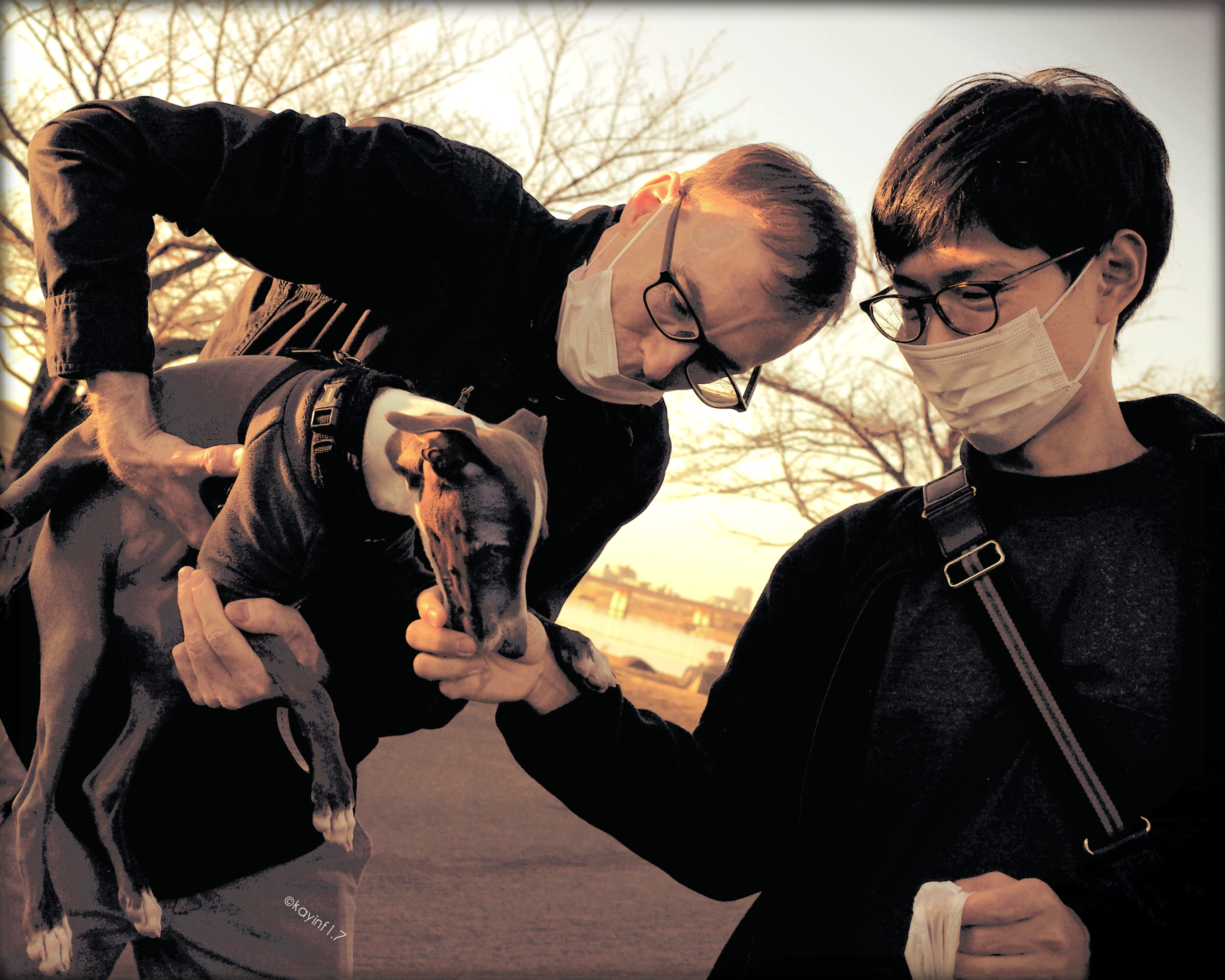
▲左から愛犬のリラ、アンドリューさん、康平さん
問題の所在
今回の訴訟の争点は…?
アンドリューさんが居住資格として本来希望したいのは「日本人の配偶者等」の在留資格ですが、ふたりは日本では法的婚姻関係が認められないため現状取得が難しく、今は代わりに家族関係等に基づき安定した在留を認める「定住者」の在留資格を求めています。
本ケースでは、
異性カップルであれば「日本人の配偶者等」の在留資格により在留が認められるところ、同性カップルの場合はカップルとしての関係に基づく安定した在留資格が与えられないのは、憲法や国際人権法等にてらして違法ではないか
が争点となっています。
なお地裁判決では、「定住者」でなくとも活動資格としての「特定活動」さえ認めないのは違憲ではないかとの画期的判断がなされました。
しかし、判決後も入管は「特定活動」の資格さえ未だ認めておらず、現在のアンドリューさんは立場の大変弱い「短期滞在」で日本に一時暮らしている状況です。
「定住者」の在留資格を得られないことによる不利益
では、「定住者」の在留資格を得られないことにより、どのような不利益が康平さんとアンドリューさんに生じているのでしょうか。
愛する人と家族として平穏に生活できないこと
アンドリューさんは現在、一時的な在留資格である「短期滞在」で日本に滞在していますが、「短期滞在」の在留資格では住民票もなく、仕事をすることもできず、国民健康保険に加入することができないので病院にもなかなか行けない、という生活を余儀なくされています。また、在留期間は90日で、その後日本にいられるかも保障されていません。
ふたりは、この裁判の結果や今後の「出入国在留管理局(以下、入管)」の判断によっては、今後、日本で一緒に暮らすことができなくなります。その場合、ふたりで海外に移住するのか、仕事はどうするのか等、今後の人生設計ができない、きわめて不安定な状態におかれています。
多くの国際同性カップルに共通の問題
この問題は日米の同性カップルに限られたものではありません。ふたりと同じ問題に、他の多くの日本国籍-外国籍同性カップルが大変な思いをしています。
日本に住むカップルは、パートナー関係に基づく在留資格が認められないことから、留学や就労など、パートナー関係とは関係ない在留資格で在留するほかありませんが、学校を卒業したり、失業や定年などで在留資格の更新ができなくなるリスクと常に隣り合わせで、多くのカップルが将来の見通しの立たない不安定な状況に苦しんでいます。
原告らの思い
康平さんからのメッセージ
自分の愛する家族と一緒に暮らしたいだけなのに、なぜその権利が与えられていないのか?特別な権利を主張しているわけでもなく、特別扱いを求めているわけでもないのに、なぜ日本人が日本で愛する家族と共に暮らしたいと望むことが特別な権利を主張していると言われなければならないのか?怒りと悲しみでいっぱいです。この状況をこの訴訟を通して少しでも改善し、我々を含め現在同じ状況にいるカップルの救済、また将来のほかのカップルが同じ困難に陥らないよう、ご支援の程どうぞよろしくお願い申し上げます。
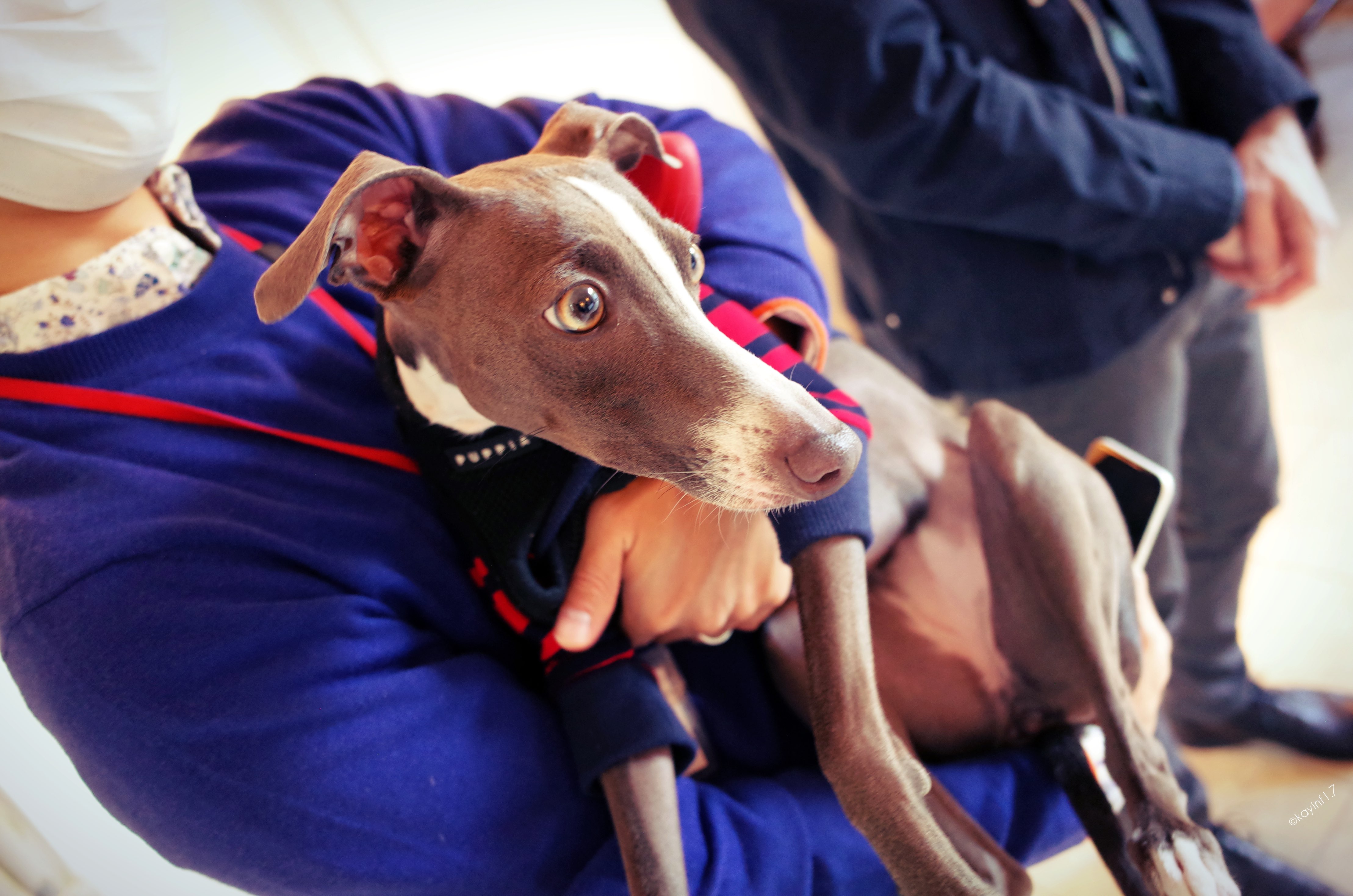
▲愛犬のリラ。2020年にふたりの家族として迎え入れた。
訴訟を通じて実現したいこと
同性カップルにも安定した在留資格を
同性カップルも、異性カップルと同様に、パートナーとの関係に基づき、日本で安定した在留資格が認められることを求めています。
同性どうしであっても、お互いに一生をともにすると誓ったカップルの関係は、家族にほかなりません。家族が一緒に暮らすのは当然です。憲法や国際人権法で保障された権利です。
早期の解決の必要性
現在、すべての人に結婚の自由を求める運動や訴訟が、日本各地で行われています。
在留資格の問題も、同性婚ができるようになれば、異性カップルと同様に配偶者としての在留資格が与えられるために解決します。
しかし、原告カップルをはじめ、「愛する人と一緒に暮らしたい」という人として当たり前の願いを持つ多くの国際同性カップルは、同性婚の制度ができることを待ってはいられません。入管の運用さえ改めれば、原告ら及び同様の状況にある国際同性カップルに対し、「定住者」の在留資格を与えて、日本で安定した生活ができるようにすることは可能であり、ただちに実現されなければならないと考えています。
寄付金の使途
主な使途は、この訴訟の主要な法律上の争点となる事項について、専門家に意見書を依頼するための費用です。現在、複数の専門の研究者に対し、意見書の作成を依頼しています。
もしも余った場合には、印紙代・謄写費用・翻訳費用等の必要経費、弁護士費用等に使う予定です。
地裁判決と控訴審に向けて
東京地裁判決が出され、結果は、実質勝訴と言えるものになりました。
判決のポイントは、下記の通りです。
・入管が、異性カップルであれば認められる「定住者」の在留資格を同性カップルに認めなかったことは違法ではない。
・日本国外で結婚している外国籍どうしの同性カップルであれば、一方に日本での有効な在留資格があることにより認められる「特定活動」の資格は、日本国籍者と外国籍者の同性カップルにも認められるべきだった。
(認められないとする運用は憲法14条1項の趣旨に反する)
・しかし、「特定活動」の資格を認めない運用に疑義がなかったこと、入管庁長官に指示を仰いでいることから、東京入管局長に過失は認められないため、原告の国家賠償請求は認められない。
判決の主文では原告の請求が棄却されたとはいえ、少なくとも「特定活動すら認めないことは違法」という判断がされた意義は大きいと言えます。
しかし、判決後も入管がアンドリューさんに「特定活動」の在留資格を付与しなかったこともあって、康平さん・アンドリューさんは、東京高等裁判所に控訴しました。
この訴訟は、多くの重要な法律上の論点を含んでおり、控訴審では、重要な論点について、専門の研究者の意見書を提出する方針です。
担当弁護士のメッセージ
アンドリューさんに「定住者」の在留資格を与えないという国の処分は、同性愛という「性的指向」に基づく不合理な差別であり(憲法14条、自由権規約26条)、アンドリューさんと康平さんの、家族生活を形成し、維持する権利(憲法13条、自由権規約17条・23条)を侵害するものです。
高裁では、あらためて、「定住者」の在留資格を認めないのは違法との判断を求めていくとともに、高裁の審理を待たず、アンドリューさんに対して早期に安定した在留資格を付与するよう、日本政府に働きかけていく所存です。
担当する弁護団
鈴木 雅子(東京弁護士会)
永野 靖(東京弁護士会)
山下 敏雅(東京弁護士会)
横山 佳枝(第二東京弁護士会)
丸山 由紀(東京弁護士会)
上杉 崇子(東京弁護士会)
高橋 済(東京弁護士会)
LGBTの権利の問題に取り組んできた弁護士と、在留資格の問題に取り組んできた弁護士がチームとなって取り組んでいます。
Toward the Supreme Court Appeal
The appellate court judgment handed down on November 2, 2023, at the Tokyo High Court did not recognize our argument that Andrew should be granted a "resident" visa status. Following the initial court judgment, Andrew was granted a "designated activities" visa status during the pending appeal. However, the "designated activities" granted to Andrew are highly disadvantageous when compared to the "Japanese spouse or equivalent" visa status, typically given to opposite-sex couples, as it generally does not allow for employment. Andrew should be granted a stable visa status based on his partnership with Kohei, and the "designated activities" visa with work restrictions is insufficient.
The appellate court acknowledged that the absence of a visa status equivalent to the "Japanese spouse or equivalent" for same-sex partners who have entered into same-sex marriages abroad could raise issues under Article 14 of the Japanese Constitution. Still, it ruled that it has not been established that the reality of their social relations and everyday life, at the time when the non-approval decision was made, is sufficient for the same legal status as marriages between opposite-sex couples. Therefore, the court concluded that not granting the status of "resident" with the same level of protection as the "Japanese spouse or equivalent" was not a violation of Article 14 of the Constitution and not illegal.
We see the idea behind the decision that for same-sex couples, it may just be unfortunate that they do not receive the same level of protection as opposite-sex couples. This is, indeed, discrimination based on sexual orientation, and accepting it would mean that same-sex couples cannot achieve a stable life and residence status in Japan, as is afforded to opposite-sex couples.
In the Supreme Court appeal, we will seek to rectify this and fight for equal treatment.
[Regarding the Use of Donations]
The donations received up to the appellate court were primarily used for requesting expert opinions. We sincerely appreciate your support.
For the Supreme Court appeal, there will be expenses of approximately 120,000 yen for items such as stamp duties (application fees) and postage fees to be paid to the court. To cover these expenses and lawyer fees, we have decided to call for your support once again. We ask for your further assistance and collaboration in expanding the circle of support.
[A Message from the Plaintiffs for the Supreme Court Appeal]
A Message from Kohei
We have come this far thanks to your support. Andrew was granted a "designated activities" visa, but it does not represent true equality. We, and others in our same position, are not seeking any special rights or privileges. We simply want to have the same rights that are available to all Japanese citizens. For this reason, it's important to continue fighting in the Supreme Court. We humbly ask for your continued support.
A Message from Andrew
We just would like to thank everyone so much for their support as we proceed onto the Supreme Court – hoping of course that the Court will not only accept our case for consideration but will also understand the important Constitutional questions around equality that it involves. Recognizing the larger questions in this case is central to what we understand to be its importance: it’s not just about immigration, rather it’s fundamentally about the equal recognition of same sex relationships. And that in turn is about human rights and dignity. Thank you again so much for your support.
Background
To Live Together in the US and in Japan
Andrew, an American citizen, and Kohei, a Japanese citizen, are an international same-sex couple. They were married in the US in 2015. They have now welcomed their beloved dog into their life and are living together as a family in Japan. However, their family life is at risk of being forced to end.
Kohei was born and raised in Japan. After graduating from high school, he studied abroad in the US and met Andrew, and they began living together in 2005. In order to continue to live with Andrew, Kohei obtained an MBA and tried to find a job in the US, but he was unable to do so due to the 2008 financial crisis, and since same-sex marriage was not yet legalized in the US at the time, he had to come back to Japan to find a job. He currently works as a full-time employee at a Japanese company, making use of his accounting knowledge.
Andrew, on the other hand, was born and raised in the US and had a system related position at a university, but he gave up the stable employment to live with Kohei in Japan. He first came to Japan as a student in 2010. After completing his coursework at a Japanese language school, he could not get status of residence to continue to live in Japan, so he returned to the US in 2012.
In 2014, Andrew incorporated a company in Japan and returned to Japan with the status of residence based on the category of “Investment and Business” (currently renamed as “Business Manager”). However, his company’s business condition deteriorated and he could not renew his status.
By this time, same-sex marriage was legalized in the US, but as their life was already based in Japan, it was not easy for them to return to the US.
*1 A Status of Residence is a status required for those who do not have Japanese citizenship to stay in Japan. It is a legal status under the Immigration Control and Refugee Recognition Act (commonly known as the Immigration Control Act). By obtaining a status of residence that suits one’s purpose, one can stay in Japan for the permitted period of stay.
There are 29 categories for status of residence, which differ in terms of the subjects and contents. They can be broadly divided into two: residence status and activity status.
Residence status is based on status or position, and there are no restrictions on employment. Residence status has four categories: permanent resident, spouse or child of a Japanese citizen, spouse or child of a permanent resident, and long-term resident.
The other is activity status, and it has restrictions on employment. It includes categories that prohibit working in Japan in principle, such as temporary visitor, student, and dependent. It also includes categories such as “business manager” that allow working in Japan only in certain occupations, which Andrew initially had. Lastly, there is also a “designated activities” category, for which the Minister of Justice specifically designates an activity for each individual to undertake.
Denial of Status of Residence and Lawsuit
Andrew applied to change the category for his status of residence from the one he initially had to the one as a long-term resident multiple times from 2018 to 2019. However, all of his applications were denied. The Immigration Bureau kept giving the same reason for denial: “They are a same-sex couple of a Japanese national and a foreign national.”
In response to the denials by the Immigration Bureau, Andrew and Kohei filed (1) an administrative litigation seeking recognition of Andrew’s status of residence as a long-term resident, and (2) a lawsuit seeking state compensation for damages on the two incurred by the denials.
Andrew and Kohei know several couples who gave up on living together in Japan and moved to other countries where same-sex marriage is legalized. However, the two realize that the issue they are facing is not just about Andrew’s right to stay in Japan as a foreign national but also about Kohei’s right as a Japanese national. They discussed and reached a conclusion where they have to file a lawsuit and change society by speaking up about the injustice of not being able to live with their loved ones, especially for Kohei, in his own country.
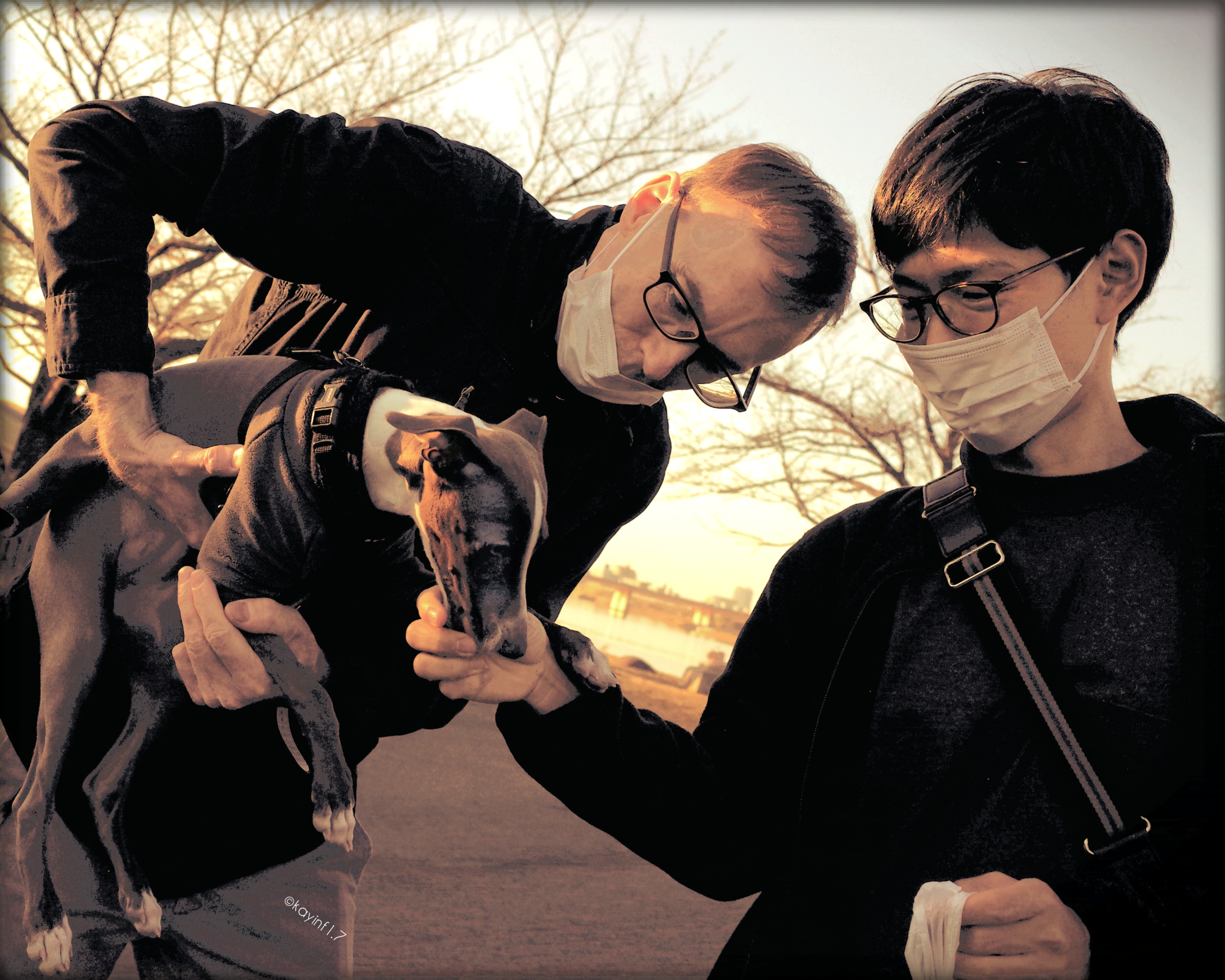
▲From the left, Beloved dog Lila, Andrew and Kohei.
What This Lawsuit Challenges
Andrew originally wanted status of residence based on the category of “Spouse or Child of Japanese National.” However, as same-sex marriage is not legalized in Japan, it is difficult for him to obtain the status. Therefore, he is now seeking status of residence as a long-term resident. Those who have familial relationships with Japanese citizens can obtain this status.
International heterosexual couples are granted status of residence based on the category of “Spouse or Child of Japanese National,” whereas international same-sex couples are not. What this lawsuit challenges is that this difference violates the Constitution and the international human rights law.
The District Court has ruled that it is unconstitutional to not grant status of residence at least based on the category of “Designated Activities” for same-sex couples. This was a significant step forward although the court did not rule that it is unconstitutional to not grant status of residence based on the category of “Long-Term Resident.”
However, even after the ruling, the Immigration Bureau has not granted Andrew status of residence based on the category of “Designated Activities.” As a result, Andrew is currently staying in Japan as a temporary visitor, which is an unstable status.
Disadvantages of Not Being Able to Obtain Status of Residence as Long-Term Resident
What are the disadvantages that Andrew and Kohei are facing as a result of Andrew not having status of residence as a long-term resident?
They Cannot Live with Their Loved One as a Family
Andrew is currently staying in Japan as a temporary visitor. However, temporary visitors are not allowed to obtain a resident card, to work, or to sign up for the National Health Insurance, which prevents them from seeing doctors. The period of stay is limited to 90 days, and renewal of status is not guaranteed.
It is highly likely that the two will no longer be able to live together depending on the decision by the Immigration Bureau. With the decision hanging, they are in an extremely precarious situation where they face the possibility of changing the life they have, such as which country they will have to go to, and which job they will have to find.
Many International Same-Sex Couples Face the Same Problems
Andrew and Kohei’s situation is not unique to them. Many other international same-sex couples are struggling with the same problems and facing precarious situations. If they reside in Japan, they are always at risk of not being able to renew their status of residence. As their status of residence is not based on their marriage, their status of residence has to rely on the categories such as student or working When they finish their studies or when they lose their job, there is no guarantee that they can renew their status of residence.
Hopes of the Plaintiffs
Will they have to leave Japan if the Immigration Bureau does not grant Andrew status of residence as a long-term resident? Even if they have to, where do they go? Andrew has already sacrificed his career in the US to live with Kohei in Japan. If they have to leave Japan, then Kohei has to sacrifice his career in Japan. It is not easy for them, given their age too, to leave the foundations of their lives and careers in Japan that they have cultivated together for the past 13 years.
The two have always had to fight with issues regarding status of residence and had to take many detours. They could not even fulfill their wish to live a peaceful and modest life together, which is a natural human desire. This was all because of the discrimination towards their sexual orientation, through which they have held anger.
Of course, if same-sex marriage is legalized in Japan, issues regarding status of residence will be resolved as well. However, the path to legalize same-sex marriage in Japan seems long. They believe there will be many more couples like them who will suffer.
The issue that international same-sex couples cannot live together as a family in Japan and the issue that same-sex couples cannot marry in Japan should be regarded as two separate problems. As the former should be and can be promptly resolved, they decided to file the lawsuit.
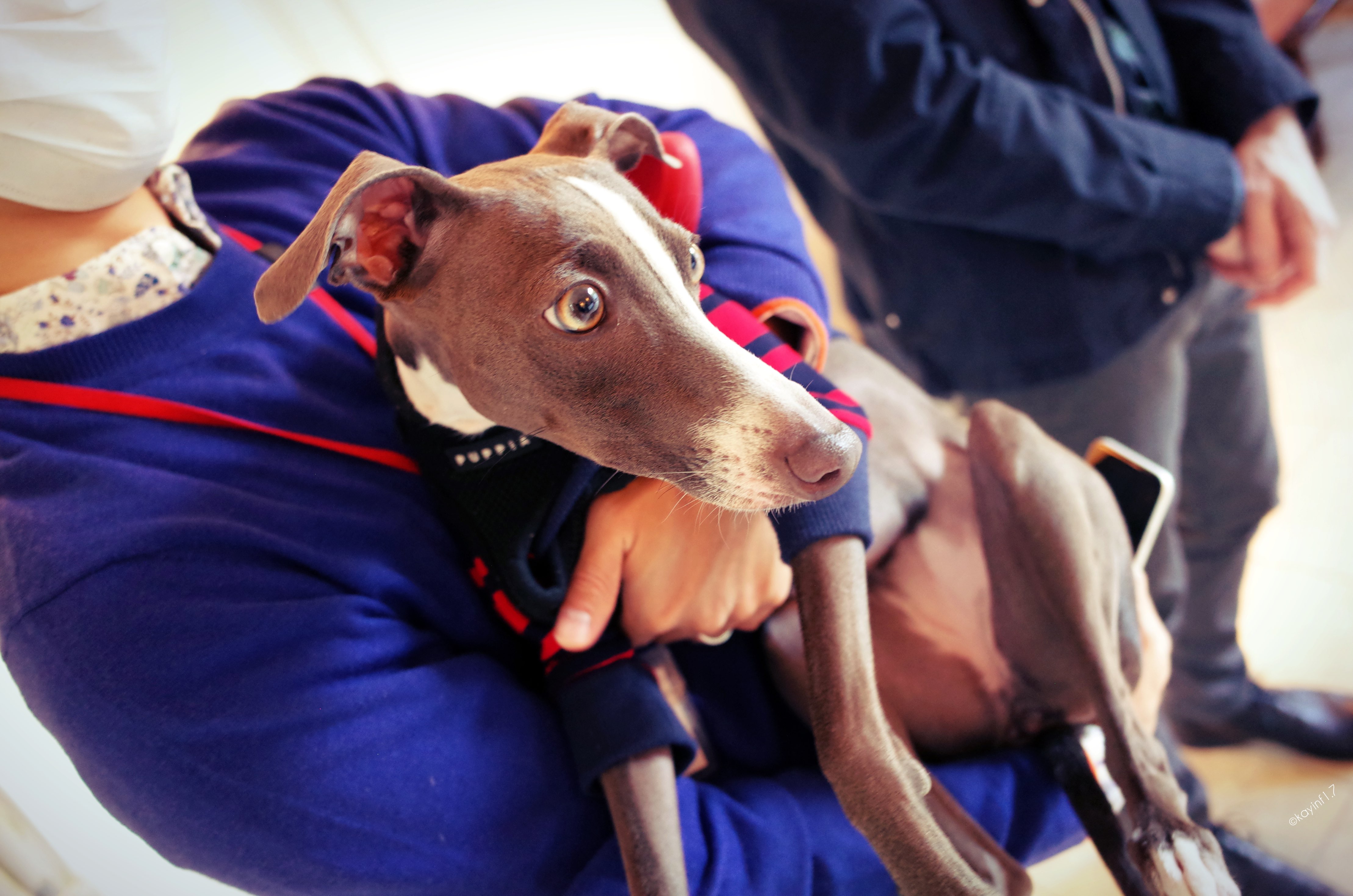
▲They welcomed a dog Lila in 2020 as part of their family.
What the Lawsuit Tries to Achieve
Stable Status of Residence for Same-Sex Couples
Stable status of residence should be granted for same-sex couples, just like heterosexual couples, based on their relationship with their partners.
When two people pledge to spend the rest of their lives together, they become family. There is nothing different about that with same-sex couples. They have the right to live together as a family, and the right is guaranteed by the Constitution and the international human rights law.
Necessity for Early Resolution
Movements and lawsuits that demand legalization of same-sex marriage are currently happening throughout Japan. Same-sex couples would no longer have to worry about status of residence if same-sex marriage is legalized.
However, Andrew and Kohei’s desire cannot wait for the legalization of same-sex marriage. Everyone has the desire to live with a person they love. It is a natural human desire and requires an early resolution. Even without legalization of same-sex marriage, only if the Immigration Burean changes how they treat international same-sex couples and grants Andrew the status of residence as a long-term resident, Andrew and Kohei can live a stable life as a family in Japan. We believe the Immigration Bureau must make the change immediately.
Use of Funds
The primary use of the funds is for the cost of expert written opinions on major legal issues in this lawsuit. We are currently requesting several researchers in various fields for written opinions.
The extra funds will be used for necessary expenses such as stamps, copying, translations, and attorney fees.
The District Court Judgment and the Upcoming Appeal Trial
The judgment from the District Court was practically a win for Andrew. Here are the key points in the judgment.
It is not illegal for the Immigration Bureau to deny Long-term Resident status to same-sex couples.
The “designated activities” status is granted to same-sex couples of foreign nationals who are married outside of Japan if one of them has a valid status of residence in Japan. This status should be granted to same-sex couples of a Japanese national and a foreign national as well, and not granting it violates the intent of Article 14, Paragraph 1 of the Constitution.
However, the claim for state compensation is not allowed because the Director of the Tokyo Regional Immigration Bureau is not found to be negligent. The legality of execution of the immigration law, which does not recognize “designated activities” status to same-sex couples of a Japanese national and a foreign national, was not disputed, and the Director asked the Commissioner of the Immigration Service Agency for instructions.
Even though the plaintiff’s claim was dismissed in the main text of the judgment, it is significant that the court acknowledged the illegality of not recognizing “designated activities.” However, even after the judgment, the Immigration Bureau did not grant Andrew the residence status of “designated activities,” Kohei and Andrew appealed to the Tokyo High Court. As this lawsuit contains a number of important legal issues, we plan to submit expert written opinions to the High Court.
Message from the Lawyers
Denying Long-term Resident status to Andrew is an unreasonable discrimination based on his sexual orientation, homosexuality, (Article 14 of the Constitution and Article 26 of the Covenant on Civil Liberties). It also violates the rights of Andrew and Kosuke to form and maintain a family life (Article 13 of the Constitution and Articles 17 and 23 of the Covenant on Civil Liberties).
At the upcoming appeal trial, we are going to ask the High Court to rule that it is illegal to deny Long-term Resident status to Andrew again. At the same time, we will also urge the Japanese government to promptly grant him a stable status of residence.
Defense Team
Masako Suzuki (Tokyo Bar Association)
Yasushi Nagano (Tokyo Bar Association)
Toshimasa Yamashita (Tokyo Bar Association)
Yoshie Yokoyama (Daini Tokyo Bar Association)
Yuki Maruyama (Tokyo Bar Association)
Takako Uesugi (Tokyo Bar Association)
Wataru Takahashi (Tokyo Bar Association)
Lawyers who have worked on LGBT rights issues and lawyers who have worked on residency status issues are working as a team.
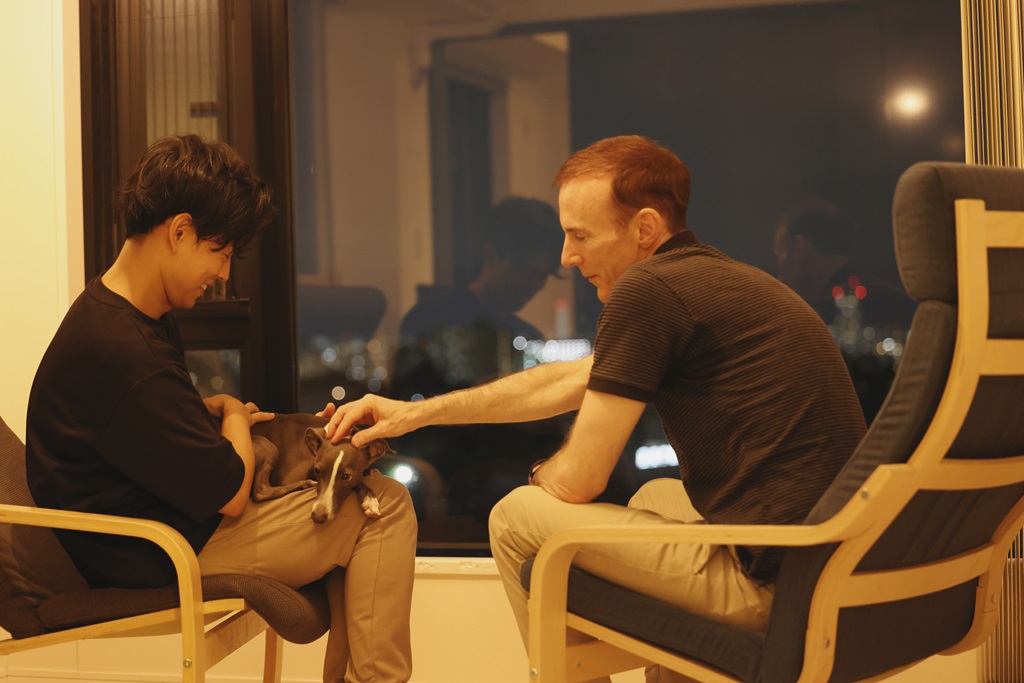
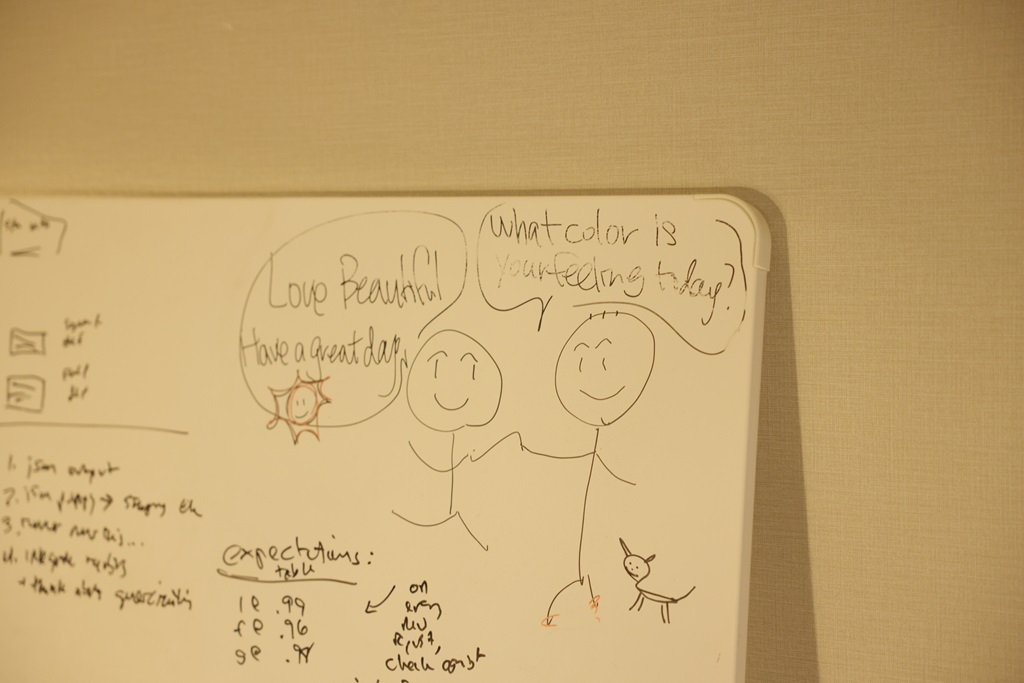 2023. 10. 31日本で家族そろって暮らす自由を、平等な制度を求めて日米同性カップルの在留資格をめぐるストーリー2023. 10. 31続きはこちら Click here to read more.
2023. 10. 31日本で家族そろって暮らす自由を、平等な制度を求めて日米同性カップルの在留資格をめぐるストーリー2023. 10. 31続きはこちら Click here to read more.
 2023. 10. 31Fighting for the Freedom to Live Together as a Family in JapanA story about the residence status of a Japanese and American same-sex couple2023. 10. 31続きはこちら Click here to read more.
2023. 10. 31Fighting for the Freedom to Live Together as a Family in JapanA story about the residence status of a Japanese and American same-sex couple2023. 10. 31続きはこちら Click here to read more.